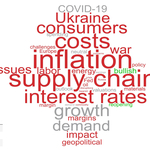Investor Sentiment More Downbeat amid Compounding Headwinds and Increasing Uncertainty about Growth
- 43% of investors describe their views as Neutral to Bearish or Bearish, more than double last quarter and the highest since June 2020; only 26% are Neutral to Bullish or Bullish, down from 52%
- 35% describe executive tone as Neutral to Bullish or Bullish, down from 69% last quarter; 25% characterize it as outright downbeat, up from 7% quarter
- 45% expect strong demand levels to continue in 2022, a significant decrease from 82% last quarter
- 89% report more concern (aided) or a continued high level of concern with inflation, slightly up from 86%, followed by labor availability (80%) and supply chain disruption (70%)
- 57% cite rising interest rates as a top concern with the most investors expecting four interest rate hikes in 2022
- 66% expect the Eurozone economy to Worsen over the next six months, followed by China (43%) and the U.S. (34%)
- In a pulse poll of investors since April 4, 53% believe the U.S. could go into a recession in the next 12 months
Click Here to Access the Full Report
HARTFORD, Conn.–(BUSINESS WIRE)–Corbin Advisors, a strategic consultancy accelerating value realization globally, today released its quarterly Earnings Primer®, which captures trends in institutional investor sentiment. The survey, which marks the 50th issue of Inside The Buy-side®, was conducted from March 8 to April 7, 2022 and is based on responses from 83 institutional investors and sell side analysts globally, representing more than $7.3 trillion in equity assets under management.
After investor sentiment rebounded and inflected more favorably heading into 2022 as the prospect of continued strong demand outweighed mounting headwinds, our survey this quarter finds a reversal in sentiment given more pronounced inflation concerns as well as emerging growth uncertainty amid the dynamic geopolitical environment, rising interest rates and less upbeat consumer confidence.
Approximately one-quarter of surveyed investors, 26%, describe themselves as Neutral to Bullish or Bullish, down from 52% last quarter, while 43% are downbeat, more than double last quarter and the highest level since June 2020. Driving more bleak sentiment this quarter is 89% reporting more concern or a continued high level of concern with inflation, with four interest rate hikes expected on average in 2022, and 68% believing consumer confidence will Worsen over the next six months, up from just 25% last quarter.
Furthermore, more than 80% report being concerned about the impact of the Russia-Ukraine war on the global economy and equity markets, with 66% expecting the Eurozone to Worsen over the next months amid rising energy prices and increasingly challenged supply chains.
As a result, while margin concerns have been prevalent since mid-2021, additional headwinds have now also created investor angst around the sustainability of growth and demand for the second half of 2022 into 2023. Nearly 60% expect Margins to Worsen, with mixed views on FCF and EPS. While Organic Growth is expected to Stay the Same or Improve this quarter, this is less rosy than previous expectations with 42% believing the first half will be stronger from a growth perspective than the second half. Moreover, only 45% now expect strong demand levels to continue throughout 2022, a significant decrease from 82% last quarter. U.S. GDP expectations remain at 3.3% for the year, down from 3.6% last quarter. In a pulse survey over the last week, 53% of surveyed investors believe we are more likely to see a recession in the next 12 months.
For the first quarter 2022, while 70% believe earnings will be flat to improving sequentially, down from 84% QoQ, nearly double anticipate results to be worse QoQ. Further, fewer expect consensus beats (16% vs 44% QoQ) and more are bracing for misses (27% vs. 8%). Mark Mandziara, Senior Managing Director at BTC Capital Management commented, “Macro, geopolitical events, rising input costs and supply chain challenges hampered 1Q 2022 earnings. Earnings should be in line with consensus, reflecting a downward trend in analyst revisions through Q1 2022.”
“Heading into the Q3 2021 earnings season, we identified a meaningful down shift following five quarters of increasingly bullish investor sentiment due to mounting apprehension over known headwinds, namely supply chain, inflation and labor shortages, as well as heightened uncertainty around looming interest rate hikes. Corporations, still seeing record demand and growing backlogs, delivered better-than-expected Q3 performance and a bullish outlook for Q4, while also offering greater recognition of increasing challenges. Executive optimism for 2021 inspired a false-positive spike in investor sentiment heading into Q4 and FY 2021 earnings season, which set the stage for disappointment, as companies delivered softer 2022 outlooks and a more conservative tone. With the advent of interest rate hikes and the additional headwind of the Russia-Ukraine war, we are at a unique inflection when increasingly bearish investor sentiment is ahead of current operating performance. A wall of perception is currently in construction,” said Rebecca Corbin, Founder and CEO of Corbin Advisors. “There is no doubt that the compounding impact of these headwinds will continue to chip away at the herculean demand driven by the capex super cycle that began following the July 2020 earnings season, and it’s simply a matter of when investor fears about slowing growth will be answered. Growth continues to abound, but we will see bigger pools of contraction as these factors wend their way through different sectors over several quarters, driven by moderations in corporate and consumer spending. As with other times over the last 15 years, when the word recession is back in print, as it is now, there is the risk of a self-fulfilling prophecy of capex tightening. Earnings calls this quarter will be dominated by continued questions on inflation and the supply chain, as well as geopolitical risk exposure, growth sustainability and margin strength.”
As for investing patterns, 66% report Holding or Rotating, up from 58% last quarter, while Net Buyers decreased to 19% from 33% and Net Sellers increased to 15% from 6%. With consumer confidence expected to worsen, Consumer Discretionary registers its second-highest level of bears in survey history, trailing only the onset of COVID-19. In the near term, Energy and Financials see the most upbeat sentiment amid rising oil prices and interest rate hikes.
Since 2007, Corbin Advisors has tracked investor sentiment on a quarterly basis. Access Inside The Buy-side® and other research on real-time investor sentiment, IR best practices and case studies at CorbinAdvisors.com.
About Corbin Advisors
Corbin is a strategic consultancy accelerating value realization globally. We engage deeply with our clients to assess, architect, activate, and accelerate value realization, delivering research-based insights and execution excellence through a cultivated and caring team of experts with deep sector and situational experience, a best practice approach, and an outperformance mindset.
Inside The Buy-side®, our industry-leading research publication, is covered by news affiliates globally and regularly featured on CNBC.
To learn more about us and our impact, visit CorbinAdvisors.com
Contacts
Media
Louisa Desson, (860) 269-9696
Louisa.Desson@corbinadvisors.com






